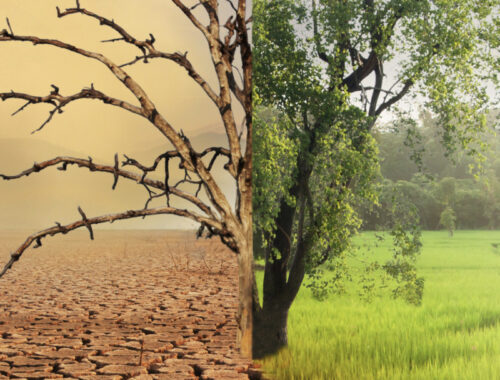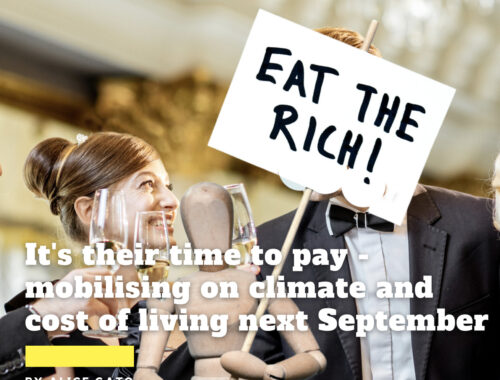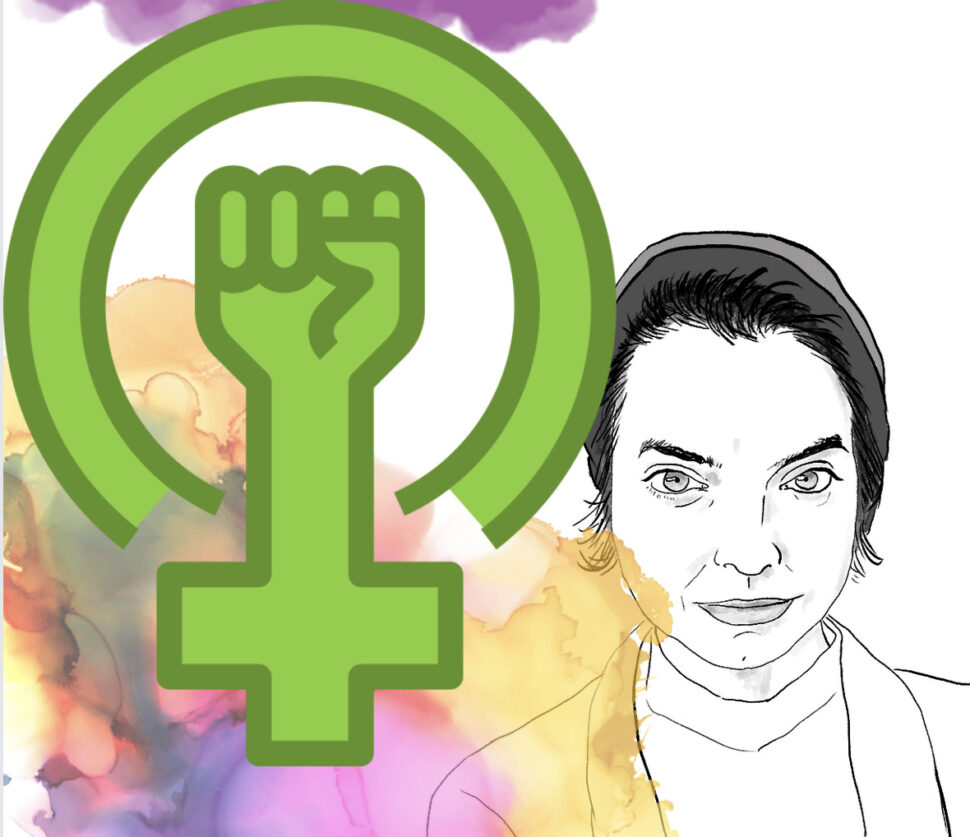
What is ecofeminism, and why is it necessary in the fight for climate justice?
Julie Gorecki speaks with Sara Bourehiyi, Joana Bregolat, Andreia Galvão, Inês Teles and Alice Vale de Gato
In January of 2022, the fifth International Ecosocialist Encounters took place in Lisbon Portugal. There, Nessim Achouche and Ralph Pritchard of the podcast Climate Crisis: Time for a New Society, put together an episode titled “What is Ecofeminism, and Why is it Necessary in the Fight for Climate Justice”, a collaboration between Rosa Luxemburg Foundation Brussels and Verso Books. The podcast was hosted by Julie Gorecki (JG), ecofeminist activist and scholar. Julie spoke with ecofeminist ecosocialist organizers Inês Teles (IT), Joana Bregolat (JG), Andreia Galvão (AG), Alice Vale de Gato (AVG) and Sara Bourehiyi (SB) about Ecofeminism as a Working Class Politics and its centrality to an ecosocialist system change and a climate just world. The following is a transcription of the exciting discussion had. You can find a link to the podcast in our website, or here.
JG: Hello and welcome everyone. I’m Julie Gorecki, an ecological feminist activist, scholar and writer. Myriam Bahaffou and I co-authored the introduction to the 2nd edition and first English translation of the 1974 book Feminism or Death by the French Feminist activist and ecofeminist Françoise d’Eaubonne. This book will be out with Verso Books in March 2022. I’m the host of today’s episode of Climate Crisis: Time for a New Society —a podcast collaboration between the Rosa Luxemburg Foundation and Verso Books.
We are here in a very sunny Lisbon today at the International Ecosocialist Encounters gathering. It’s happening this weekend from the 21st to the 23rd of January 2022.
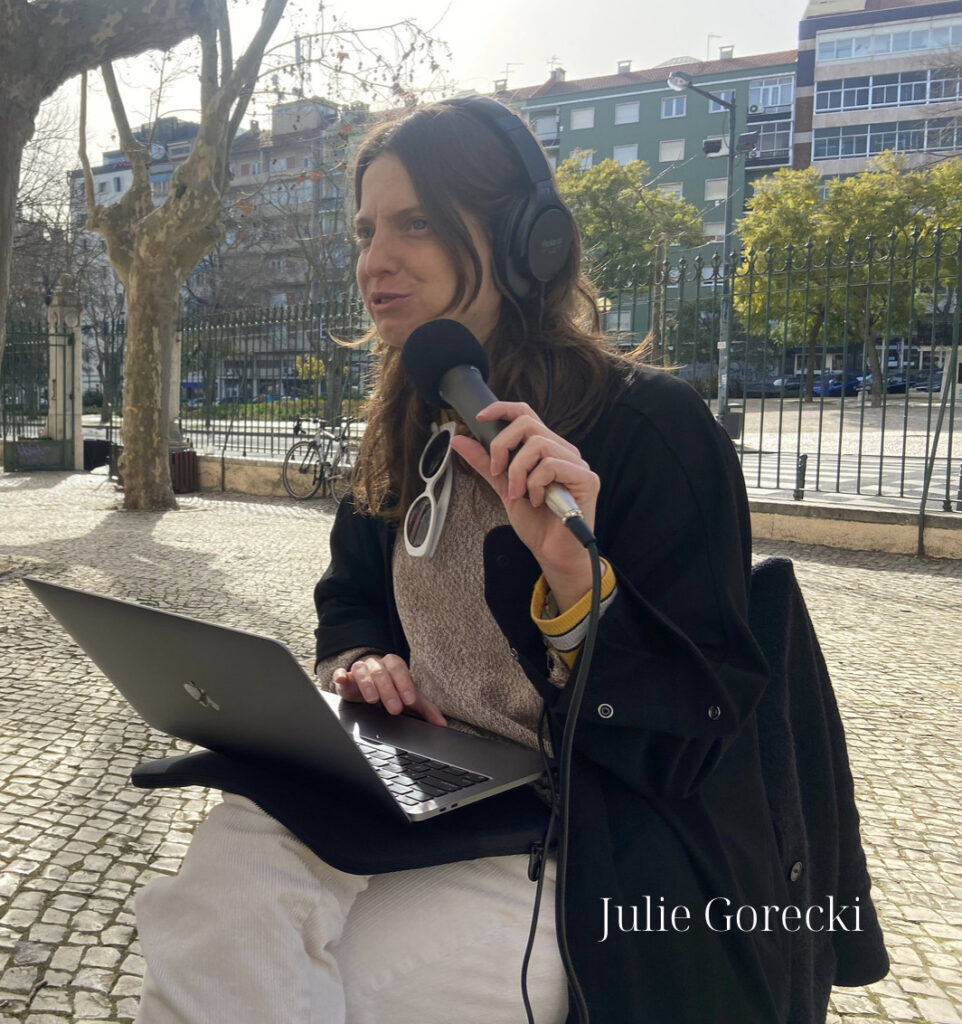
This three day public meeting is organized by Climáximo, a Portuguese climate justice grassroots group formed in 2014 which has congregated ecosocialists, ecofeminists, peasants and trade unionists amongst others in Lisbon this weekend. Numerous political organizations and activist movements are here organizing to collectively imagine and set in motion an ecosocialist system change as a remedy to climate catastrophe. This episode focuses on how ecofeminism is foundational to such a system’s change.
Ecofeminism is a feminist theory and activist movement which argues that the widespread subordination of women is inseparably linked to the devastating exploitation of the natural environment. Françoise d’Eaubonne argued that an interlinked historical oppression of women and the earth are at the root of both the environmental crisis and women’s widespread systemic domination. That the environmental crisis is in fact a result of women’s exploitation. For d’Eaubonne the remedy to this crisis is ecofeminism, Feminism or Death being the book in which the term ecofeminism is published in for the first time.
Into the 1980s and 90s ecofeminism developed as an activist theory and a vast field with several branches including spiritual, cultural, and even well… liberal ecofeminism. However, here at the International Ecosocialist Encounters gathering, we are interested in expanding on what some have called a socialist ecofeminism. Central authors of socialist ecofeminism include Vandana Shiva, Dilar Dirik, Maria Mies, Carolyn Merchant and Ariel Salleh just to name a few. And let’s not forget that indigenous, global southern and decolonial feminists and activists have been articulating capitalism’s double subordination of gender and the environment since the start of climate crisis. Lee Maracle, Kim Anderson, Gloria Anzaldúa, Arundhati Roy, and bell hooks (again, just to name a small handful) have all written on the intersections of gender and ecology. Today in the face of the climate emergency ecofeminism is resurging as a theory and a global activist movement. On the frontlines of this struggle is the transnational women and feminist for climate justice movement led by indigenous and global southern women.
And when it comes to thinking about what a working class socialist ecofeminism looks like, we are very pleased to welcome five young ecofeminist activists. With us today we have Alice Vale de Gato, Inês Teles, Joana Bregolat and Sara Bourehiyi that have brilliantly animated a panel here called Ecofeminism as Working Class Politics. We’re also joined by Andreia Galvão who is also a co-organizer of this very fabulous conference.
I’m going to start by opening up a conversation with a basic question: what is an ecofeminist working class politics, which was the name of the seminar that was held, and how does it intersect with ecosocialism?
Joana Bregolat (JB): First of all, I’m Joana. I’m from the Spanish State from Barcelona and I’m a member of Anticapitalistas, a political organisation there. I believe that when we are talking about ecofeminism as a working class politics, we are trying to expand the idea that working class politics is not just for those who are in the factories, it’s not just for the ones that are talking about feminism. It’s about all the labour that is produced in our society. All the forces that produce and reproduce our lives. It is a way to organize these kinds of work in a way that is visible, is recognized as valuable. Also in a sense I think that ecofeminism is not just for the ones that are doing the fights or the ones that are putting their bodies on the field.
It’s for the 90% of society that is not included in the politics of bourgeois democracies or in capitalist forms of organisations.
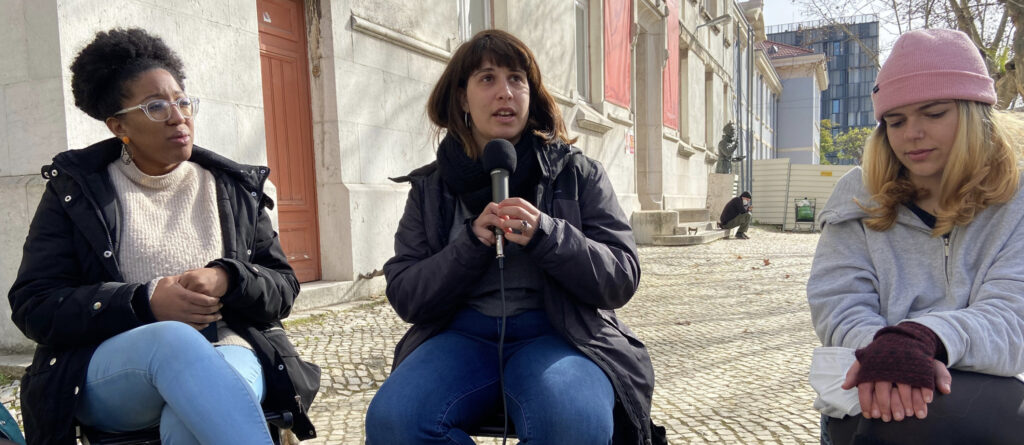
Inês Teles (IT): So, I’m Inês and I’m from Climáximo in Portugal. I guess I could say that in the climate justice movement, when we are talking about involving the labour movement in climate justice talks, we’re very often talking about climate job campaigns and trying to speak to workers in carbon intensive jobs and with the unions associated with those jobs. And we very often face a huge wall when we are trying to communicate with them. So this has led us to try to think of a different approach to labour, and that’s one of the paths that has led us to this idea of an ecofeminist working class. Because we thought that it was insufficient, not only in an organisational way, to try to only speak with these kinds of workers, but also in our conception of what we want from these kinds of campaigns.
We don’t only want current labour to change to something that is green and eco-friendly and that can stop climate change. We also want the conception of labour to be changed. To move towards that we need to change the conception we have of care work and reproductive work and metabolic work. Because that kind of work is what’s going to be central in this ecosocialist feminist world that we want to build. We need to make this shift, and so we have to focus on this work that is needed to care for each other, to care for our planet, and to be able to build an opposition to capitalist exploitation and destruction. That’s one of the parts that led us to think about an ecofeminist working class politics.
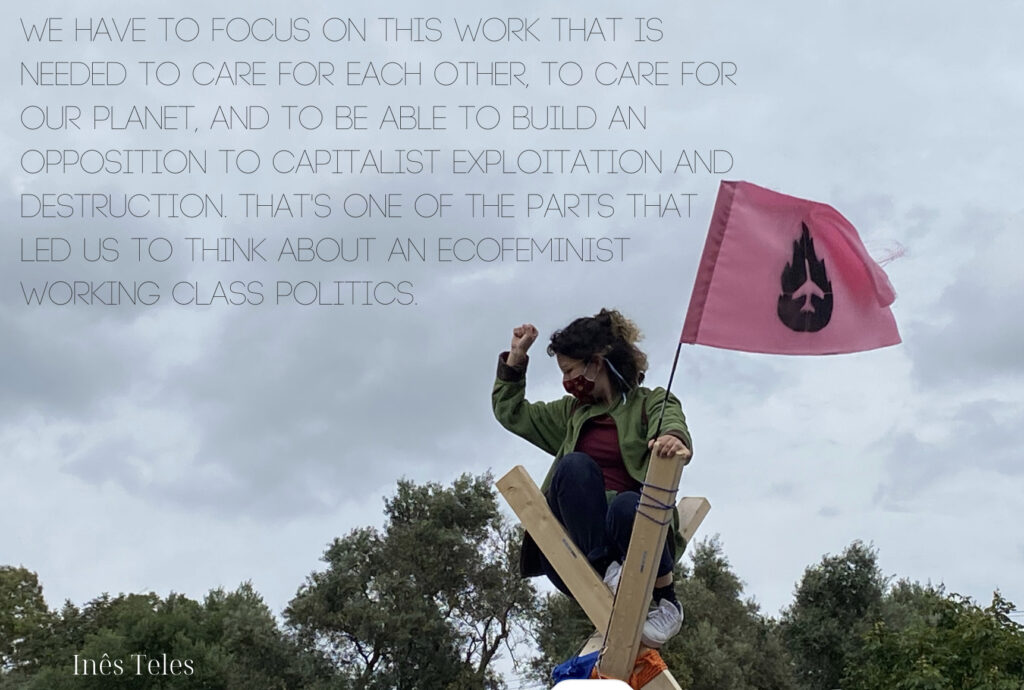
JG: Thank you for those really clear links between an ecofeminist working class politics and how it connects to the environment and kind of envisioning a climate just future. Something we haven’t really done very much in the ecofeminist movement as much as we probably should. So would anyone want to add a final thought to that?
Alice Vale de Gato (AVG): So I’m Alice, I’m also from Climáximo… I would just like to maybe add a little bit of context on this session and on what we are doing here at these Encounters. So for these Encounters, we proposed to answer two or three main questions that are really hard to answer. These questions were: 1) Who will? So who are going to be the subjects of the ecosocialist revolution? 2) How to? So how are we going to do the ecosocialist revolution? 3) Where to? So where are we going? What is the ecosocialist society going to be like?…
That’s also why we chose to focus on the ecofeminist working class. Because when we are talking about who will make the ecosocialist revolution, we have to change the revolutionary subjects that are so often associated in our heads with socialism. Because the revolutionary subjects of ecosocialism in the 21st century are really diverse from what we thought they were before.
So we really need to include everyone that is doing reproductive labour and metabolic labour and so on. We also talked about strategies of how we can organise towards the ecosocialist revolution. And one of the things that our session did was give a vision of how an ecosocialist society is going to be. Because the international ecosocialist movement really needs a direction, really needs a theory, and I think that ecofeminism needs to be that theory. Well, ecosocialism needs to be that theory, but it needs to be an ecofeminist ecosocialism…
It was extremely hard to organise this event, but it was definitely easier than leaving it to climate chaos. And it’s going to get harder and harder. For us to face the challenges that climate change brings us we really need to value care. It’s impossible not to. We really need to put life at the centre. So I think that this session also gave us a vision of what kind of society we want. And while we are organising the ecosocialist revolution we are already shaping that society.
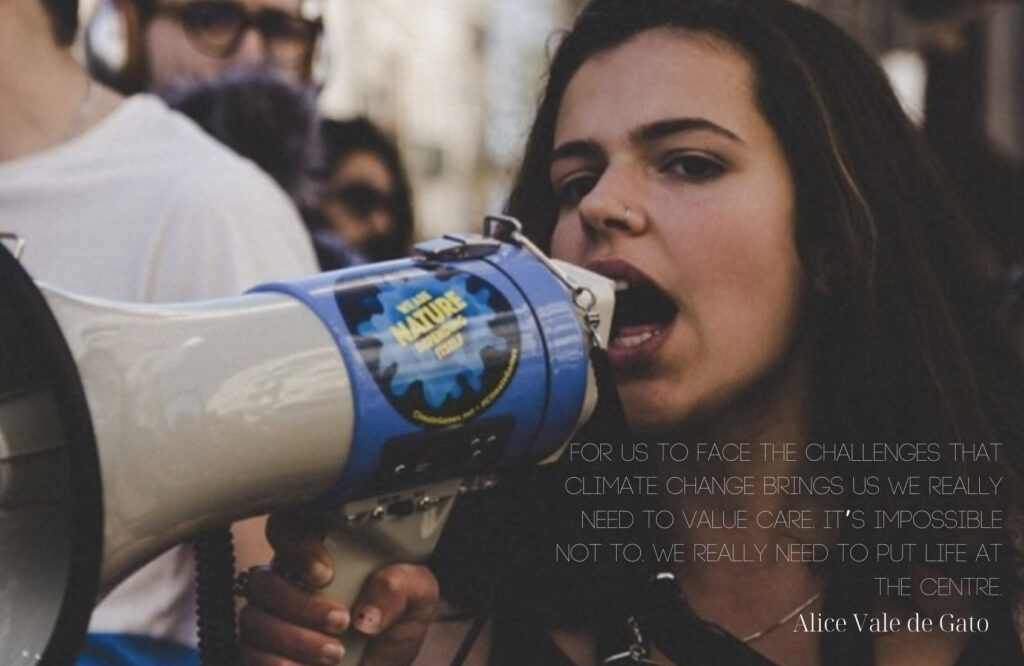
JG: Thank you so much for that. Before we move on to another question can someone take a moment to define for the listeners reproductive labour and metabolic labour concisely?
JB: For me, there’s no clear difference between metabolic and reproductive labour. But in a sense when we used to talk about reproductive labour, we were talking about taking care of people as an interdependency kind of work. And metabolic labour adds the other part. That is, co-dependency on all the work that we do. So it’s not just those who are doing the caring—making the food for your kids, doing all the laundry of everybody you live with, and all this kind of work. What is needed for this work to be recognized is for it to be visible for all of society when it’s not. The focus needs to be on the people sustaining agriculture and all the work that sustains our daily life.
AVG: I don’t want to explain more because I think you did it wonderfully. But I just want to take this opportunity to visibilize some of the invisible work that’s happened for the preparation of this session. So we actually had the wonderful help of Stefania Barca and Blanca from Observatório de la Deuda en la Globalización. And also from Ana Isla who is an ecofeminist from Peru. And we actually did a webinar about ecofeminism as working class politics on the 17th of January. We are going to make it available soon and Stefania Barca gave an amazing explanation of metabolic labour on that webinar. So I really encourage you to see it (Link: Ecofeminism As Working Class Politics Webinar – 17/01/2022 – 5th International Ecosocialist Encounters: https://vimeo.com/679705186).
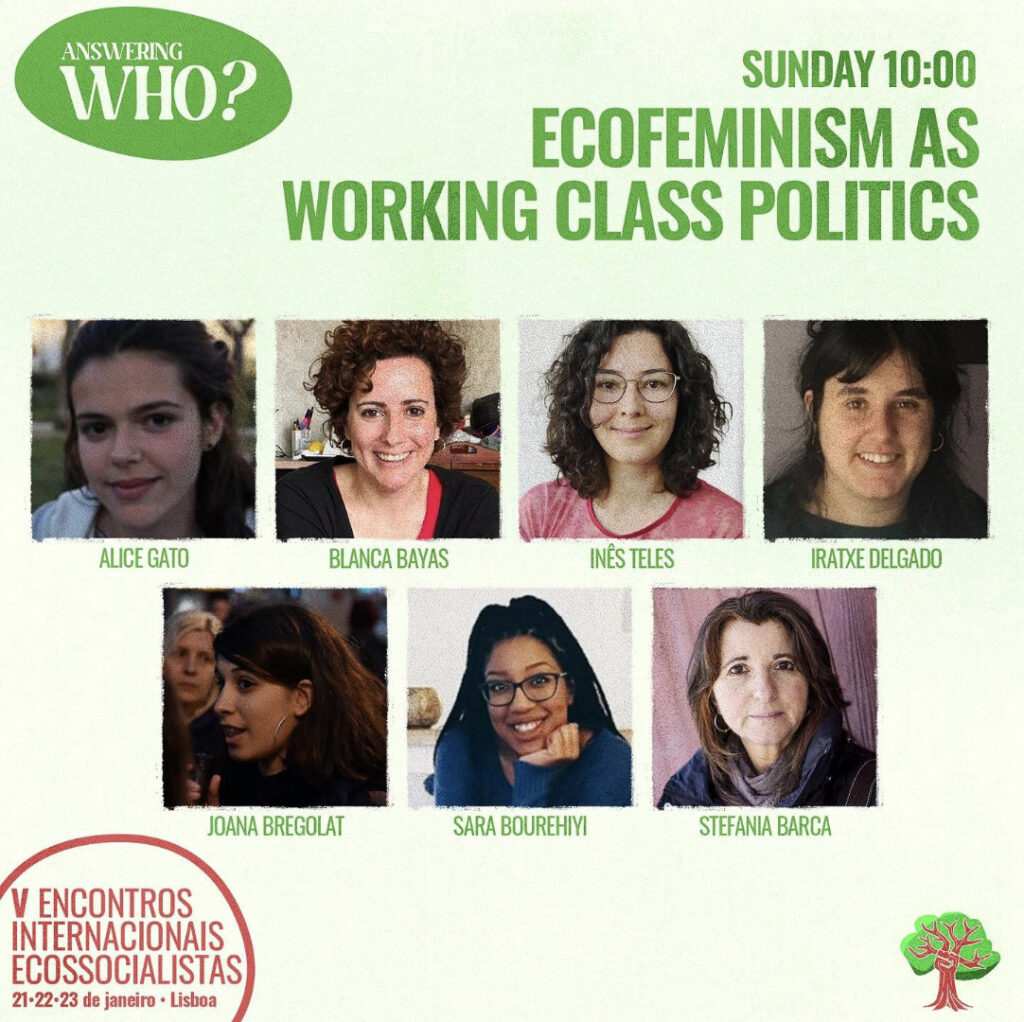
JG: I second that. Stefania Barca’s work in general on ecofeminist ecosocialism is, I think, kind of canonical at this point. It’s central. So for our listeners, if you want to get more into that, that is definitely an author to focus on.
All right, let’s move on. So far you’ve touched on the session that you all organised, which heavily focused on something we’ve already started talking about: care and reproductive labour as an economy and as a central ecofeminist working class issue. It was divided into critically discussing three strategies and tactics towards an ecofeminist ecosocialist organising. So we had ecofeminist unionism as one topic, care strike as another and care national system as a third subject. I was wondering if each of you could expand on the specific strategy you covered.
IT: I was involved in the discussion about ecofeminist unionism. We were trying to imagine what an ecofeminist unionism could look like. Some people were confused about the notion. For me it seemed more or less clear what it would be, but I guess it’s still a discussion that needs to be had. Since we were thinking about questioning this traditional concept of working class and thinking instead of an ecofeminist working class, and since unionism is a very important historical tool for labour struggles, it must also probably be important for an ecofeminist working class. But we were questioning ourselves about if ecofeminist unions would be something that would come out from already existing unions or if they would be organised as something totally new. What kinds of demands should they organise around? We all agreed that we needed strong demands that would aggregate people and touch people in specific contexts and unite us. So that we could then also be united to further discuss what we want from this ecofeminist unionism and politics.
And so we agreed that this could be something like, for example, a kind of range of care incomes or basic incomes. Something related to reduction of working hours. Something really specific that wasn’t necessarily in itself just ecofeminist demands but that could aggregate and move us towards ecofeminist work.
JB: Listening to Inês, I think that one of the principal things that we have to have in mind when we are talking about ecofeminism, is it’s a way of creating relationships and organising ourselves as a way to be able to reach power… But we are also talking about movements… tenants movements, unions rights movements, worker’s movements.In a broader sense we are talking about life. About the movements that are defending life. In a moment that life is in danger of a system that destroys life… So ecofeminism is a way to create alternative narratives on a system that doesn’t acknowledge, doesn’t believe that care is work.
Sara Bourehiyi (SB): Sara from Ecologistas [en Acción]. I’m still learning about ecosocialist and ecofeminist socialist movements. But I think that one of the main points for me is questioning the system, is questioning how unions are working right now, … and how they tend to forget a lot of people. … Which jobs do we have right now, what jobs do we want in the future, how do we organise these jobs and how is it that they are usually not in the unions. We don’t talk about reproductive labour, we don’t think about reproductive labour as labour. We think like, this is care and it’s free because it is what it is. So I think it’s a very good point to start with. Because I think for me the main point is to understand the world and who sustains the world and how we can change our relationship with nature.
So for me it was really great. I learned a lot from these Encounters and I still want to learn more. But I think this is not only for women, it’s for the whole system. It’s for everyone. It’s important to change the point of view and see where the jobs are, where the work is starting, and what we can do to change that.
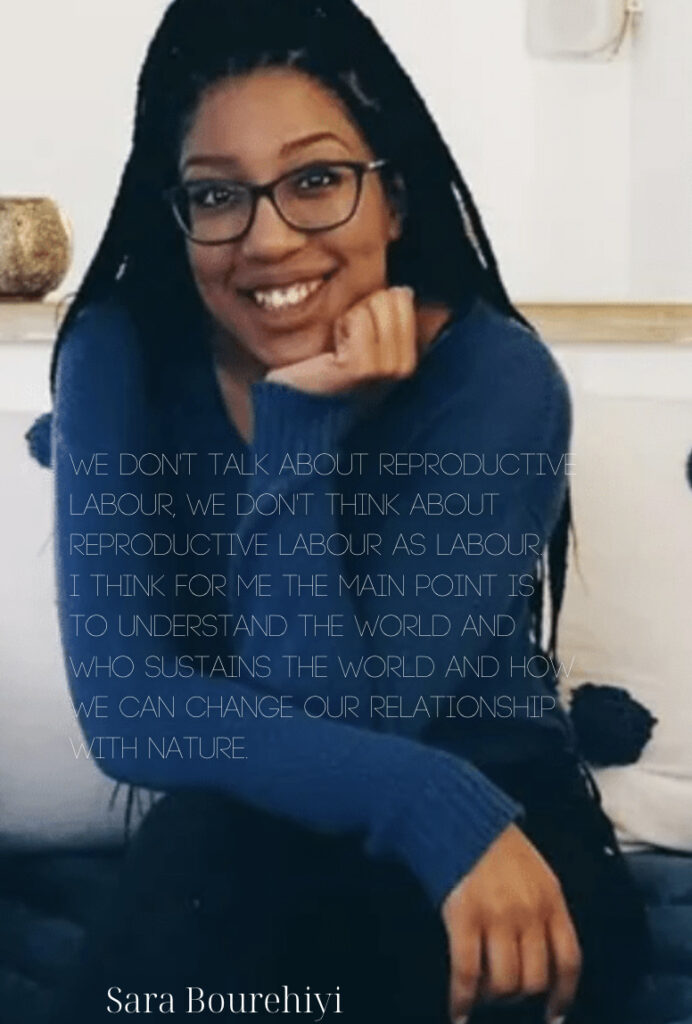
Andreia Galvão (AG): Hi, I’m Andreia and I’m organising the Encounters as Bloco de Esquerda (Left Bloc). What I think is really interesting is when you start talking about ecofeminism, but more broadly about ecosocialism, there is an idea that came up in some conversations. About questioning our bullshit jobs or the post capitalist society that makes us work many hours for jobs that mean nothing. For products that are superficial and mean absolutely nothing, in our garbage, and that will deteriorate. And at the same time we have essential work that is free. … And there is still this homogenous idea of who the working class is. And it’s exactly like Joana was saying. It’s the men that are white, that work in the factories in the 19th century.
We know that the working class today looks very differently. …There is not only the fact that people are workers, but that they are workers and they are women. And that they are women, and that they are black women, or that they are trans women. And it’s interesting, even when we are talking about ecofeminism, the need that we have to broaden our lens. Like my university, we can be speaking about feminism and second wave feminism and French feminism. At the same time, the people who clean the faculty are black women that arrive at six in the morning and that leave late and that do all the reproductive work.
We are talking about invisible labour theoretically but we are not recognising it. I think that the need to have this conversation is to have a better and fairer understanding of the world that we live in and how we can subvert the relations of oppression that we face. And with this, I also think it’s very interesting to think of the role of care in struggle. Angela Davis talks about this a lot. The idea that freedom is a constant struggle. That when we struggle we also try to create places of liberation and emancipation where people are happy. Because sometimes struggle is all we have in this world of violence. But through fighting, we can find a common ground. And I think that care is essential to that. To creating a space where we are happy, we are fulfilled, and we are struggling together.
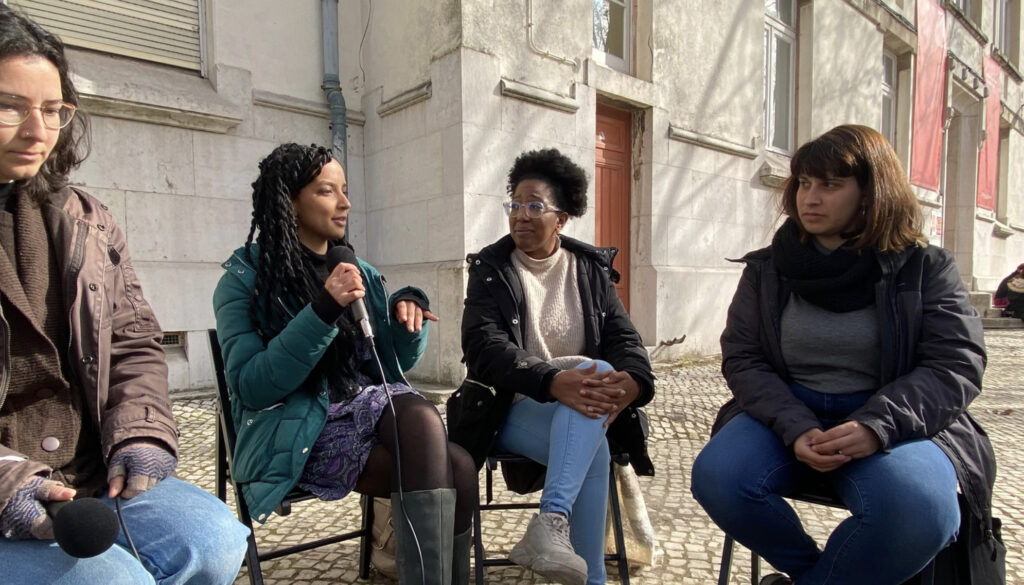
JG: Fantastic. Thank you so much for bringing that intersectional approach that was also so prominent within the session. An ecofeminist working class politics that is focused on not only gender, not only class, but also race and other more marginalised categories including sexuality. And also your point on who is cleaning in the mornings and their invisible labour. There is also the importance of invisibilised labour during Covid. When we kind of glorified this “essential worker” category. When we started thanking all the essential workers while simultaneously kind of sacrificing them to the early morning work and cleaning of classrooms during Covid. That was another focus in the session that I thought was really important that I think we’re trying to bring visibility to. So thank you again for all of those fantastic comments.
The next category that you all focused on in the session was care strike. Can we concisely talk about that before we move along?
AVG: Maybe before I talk about the care strike, I just want to talk about some of these different tactics… So ecofeminist unionism, the care strike and the care national system. All of them can also go together. So care strike is a tactic, but ecofeminist unionism is a way of organising. And care national system is a programme and you can combine all of them.
And I think that all of them bring an important aspect to the table. When we were talking about ecofeminist unionism, we need this concept. Because the current concept of unionism that we have does not encompass all the workers. We were also talking about how there is reproductive labour that you are paid for, but there is also labour that is not reproductive and that is not unionisable.
And these people still do jobs and they still need to fight for those jobs. So during the session we looked at different work categories that people do in our societies. And there are a lot of jobs that are unionisable and a lot of jobs that aren’t unionisable, but are still work. And people that are doing this work have no way of fighting for their jobs.
So I think that’s why we need to think about an ecofeminist unionism. Because how can we encompass those workers that cannot fight for their rights? I think that’s also a way of thinking about the care strike. Because usually when you think about strikes in the traditional sense, the people that decide when the strike is happening are traditionally the men. Men that work at the factory, while the woman is at home cleaning everything and cooking dinner for when the man comes back from the union meeting. And then while the man goes on strike, OK, I’m talking in a really traditional sense, but when the man goes on strike, he can go on striking because the woman is at home caring for the children and so on.
So I think that the care strike is also a way of encompassing the people that should be striking and cannot be striking. But a lot of things that arose during our session was that when you are doing a care strike, the people that are being impacted by the strike are the same people that are dependent on care. And they are not at fault of what’s happening.
One of the things that we realised while we were talking about the potential of the care strike, is that, if you are able to do a big care strike for a long period of time, the impacts are going to be completely disruptive. It’s like the moto off the feminist strike — If women stop the world stops. And I think this would be a really interesting thing to see.
At the same time, there are a lot of issues that need to be figured out. And one of the things that we were talking about during the session is how to improve the care strike, and also creating alternative ways of organising it. Where people that usually do not do reproductive labour are doing the reproductive labour side, so that the people that do reproductive labour can strike. And each time you do a care strike you get demands that allow more people to get to the next strike because people are less dependent on them. The care is more distributed. So I think that this tactic can also be a way of organising society and redistributing care work. But we still need to think a lot about it. And I think that’s one thing that is common about all of these tactics. That all of these ways of organising are so new, like they are recent ideas, and they have so much room for improvement and for exciting growth.
JB: There’s a saying in Spanish: “Queremos trabajar menos, vivir mejor, redistribuir el trabajo y la riqueza” [We want to work less, live better, redistribute work and wealth]. I think that these words are the meaning of what we are saying right now. That is, we want to be able to have lives, not just go to work and then go to work again the next day.
A cycle that never ends, is one way to say it. We also want that everybody is recognised for their jobs. For the work they are doing in society. What we want is that it’s not just on a gender basis or a race basis or a national basis. We want to believe that there’s other ways to organise our labour.
There are people who live with a lot. Who live with a lot of commodities in their lives. And then there are people who do not satisfy their needs. And we are fighting for these people to be able to satisfy their needs. And not just their needs. To be able to have a life.
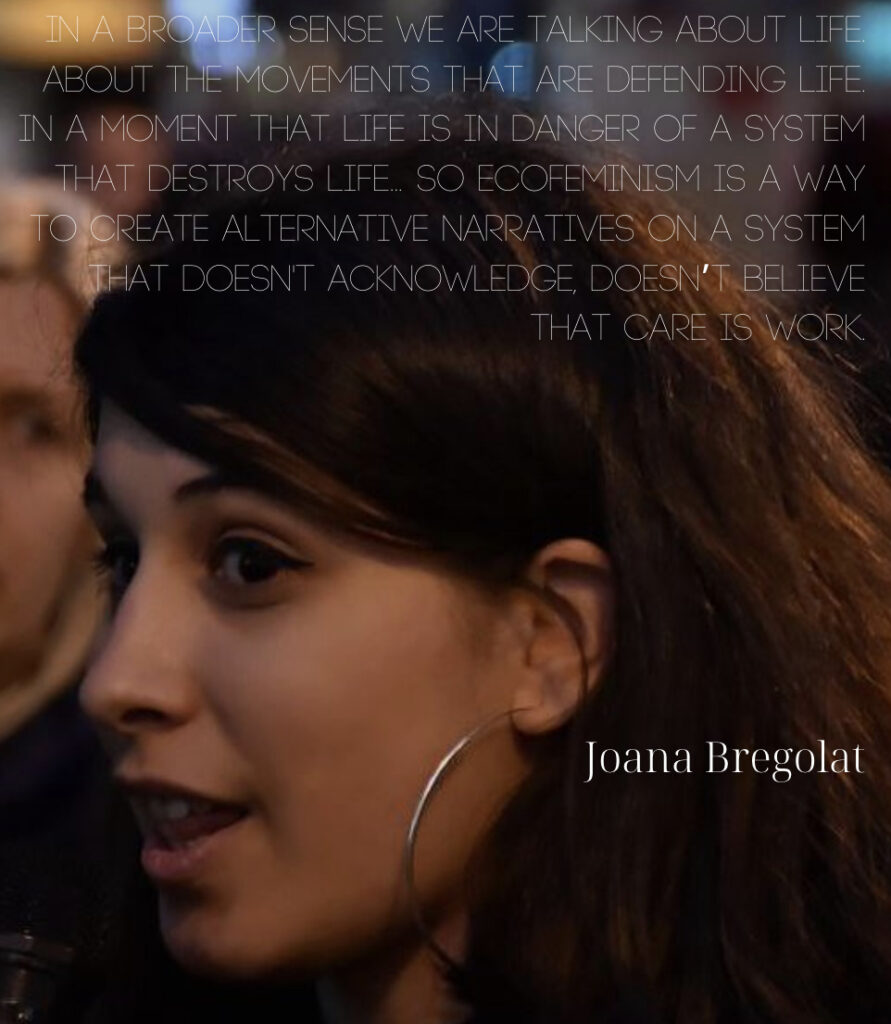
JG: Thank you. One striking commonality between all of you is that you’re all youth climate activists focusing on ecofeminist solutions to the climate crisis. I was wondering what is the importance of ecofeminism to the youth climate movement, and what is the potential of ecofeminism politicising and radicalising some parts of the youth climate movement towards system change?
AVG: I have a lot of things to say about the youth climate movement. Please don’t get me started (smiles and group laughter).
AG: No, but I think there needs to be a paradigm shift in the youth climate movement. And today we just had a session about the youth movement that was called Youth Movement Radical and Ecosocialist. And some of the conclusions were, we were talking about Fridays for Future mainly, but we were talking about our demands. We talked about how we don’t demand anything, so people give us nothing. So we are demanding climate justice, which means nothing. We are demanding uprooting the system, which also can mean nothing. Or intersectionality which can mean anything and nothing at the same time. And people give us nothing. They say, ok, we declare a climate emergency. OK, we declare climate justice. OK, we declare that we are intersectional. So I really think that there should be a bigger focus on struggling. On vulnerable communities. And even on modifying the paradigm when thinking about Future, like the movement. The main movement is called Fridays for Future.
And we are striking and struggling for our present and also for our past. For redistribution. For guaranteeing that what happened is told as what’s really happened. That we are telling the stories of colonialism, of oppression.
So I think in that sense ecofeminism as ecosocialism is essential to this idea that society needs to rapidly change. But it’s possible to have a programme that is for everyone. That is fair, that is socialist, but takes the limits of the planet into consideration. And that looks at the vulnerable communities and is able to look at the gendered division of labour and the gendered division of society. And also how the movement itself, when it doesn’t take these things into consideration, is an instrument to maintain that oppression.
AVG: One thing that I was thinking is really interesting about the concept of ecofeminism is that we have been demanding feminism, different feminisms for over decades, and we haven’t gotten there. And one thing that is interesting about putting climate justice and feminist demands together, which go perfectly well together as we have seen, is that now you have a time limit. You have a deadline to have feminism. You have until 2030. So I think this is really exciting for ecofeminism. And it also puts pressure on the youth movement and I think it’s a good pressure.
IT: I would add something about the potential for creating bridges of solidarity that comes from an ecofeminist approach. Because when you’re sometimes thinking about traditional approaches to labour, they are very focused on this kind of so-called productive labour sectors. But they stay a bit atomised. You have the fights that the transportation workers are going through for example, the struggles that fossil fuel workers and that service workers are going through. And they’re all close to each other’s struggles. But when you add this approach of ecofeminism, you realise that all of these sectors contain people who are also doing reproductive labour. They contain people who maybe are also working part time in an informal economy. Contain people that are also maybe activists for example, and fighting in their communities against extractivism. As fighting against the climate crisis as well.
And so this creates a common link between all of these sectors that transcends this idea of normal labour and that unites them. It creates the potential for a mobilisation across every kind of sector of work and towards a common goal. And when you’re thinking about the climate justice movement, you really need this kind of union. This kind of potential to create strong alliances across sectors and across communities. This potential for health care workers for example, mobilising in solidarity with mothers or with this fossil fuel sector workers. I think that this idea is very important. It’s something that can be deepened with ecofeminist approaches.
JG: I’m going to really quickly ask a question related to internationalism and an ecofeminist internationalism. For ecofeminists the links between the subordination of women and the environment are rooted in what we sometimes call the “capitalist patriarchy”, which we know is racial and colonial — a global economic system embedded within the long history of gender oppression and exploitation. Racial exploitation, class exploitation, gender exploitation. Leading ecofeminist scholars and activists Vandana Shiva and Maria Mies describe the capitalist patriarchy as a world structure in which the North dominates the South, and men dominate women through a profit driven global economy. Which today, 20 years on, we can nuance the term “men” when considering binary categories. But you know, just to build on some of the foundational ecofeminist work. If there is this global capitalist patriarchy and we know, as women from different positionalities and backgrounds, that we’re all disproportionately impacted, but in very very different ways, then how do we approach an internationalist ecofeminism knowing that we have these complicated histories?
SB: Yeah, for me, I don’t believe that there needs to be something like global. Because usually global means, something from the north is then implanted into the south. I think that we need to have alliances. We need to have networking. But we also need to take into consideration that there are so many realities, even within one country. I cannot imagine like the whole world.
So we cannot expect like something that we have created here in the global north to be followed by the global south. So maybe we can have a lot of Encounters. We need to learn about each other. We need to have this common theory but leave spaces for everyone to, I don’t know, to go wherever they want with the tools they have.
AG: Yeah, I totally agree. I think that there is a problem in thinking that there is a global solution to all the problems. And that we can approach it with the model of one size fits all. But I think that at the same time, we truly need an internationalism. Because capitalism organises internationally and so we must also struggle and fight internationally. And build tools and build networks and build relationships of trust and political propositions that take all these experiences into account.
Maybe it’s because we have so many different contexts that we need to create stronger alliances. Because we can have a broader view of society and we have a better chance of envisioning a post capitalist world and the world that exists after that. And that is able to confront the climate crisis and create new realities and new possibilities.
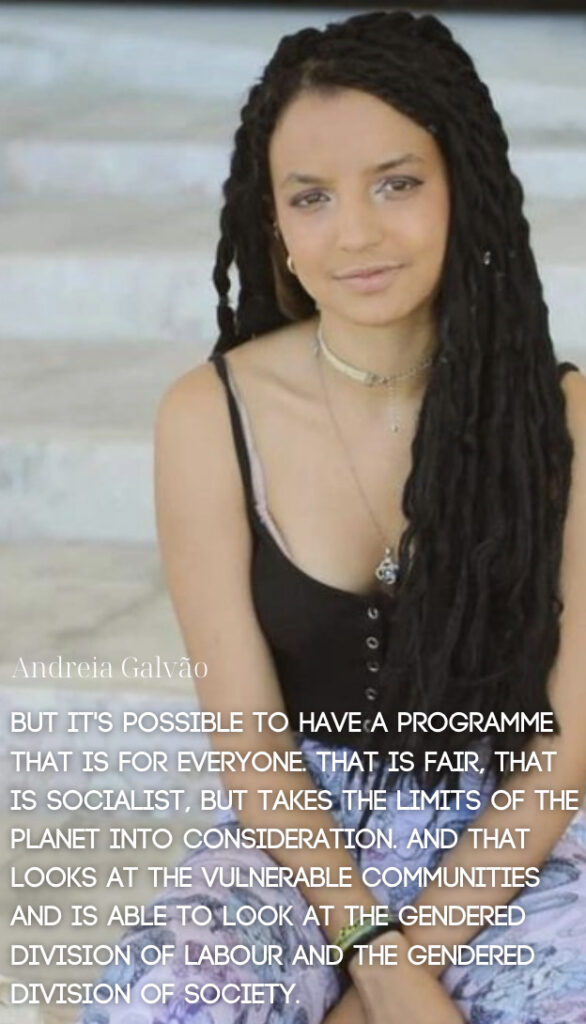
JB: I just want to add that when we’re talking about creating an ecofeminist internationalism, it’s not just talking about those who have ecofeminism as a label. It’s talking about all the communities that are doing what we consider or what we acknowledge to be ecofeminism on their own terms and in their own expressions. This means talking about communitarian feminism. It means talking about feminism that happens in the rural areas. There is an idea that feminism and all kinds of women’s organisations and subaltern organisations can do ecofeminist politics. Can be part of an ecofeminist internationalism. I think it’s really valuable to be able to understand that ecofeminism could be a category that works for us here in the global north. But maybe it has another name, another structure and another way of creating alliances, creating programmes and improving our lives in other coordinates.
JG: That is an amazing place to stop. I’d like to thank all of you and the amazing work you’re doing. I think we can maybe conclude today by saying that we’re coming out strong by visioning an ecosocialist, ecofeminist internationalism. Thank you again for taking the time.




